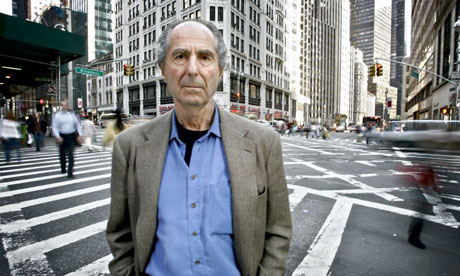
"I don't smile."
There is a long, agonising pause.
"Why don't you smile?" I ask.
"There once was this photographer from New York. 'Smile,' she always said. 'Smile!' I couldn't stand her or the whole phenomenon. Why smile into a camera? It makes no human sense. So I got rid of both her and the smile."
"Do you ever smile at all?"
He looks at me. "Yes, when I'm hiding in a corner and no one sees it."
(..)
"I would be wonderful with a 100-year moratorium on literature talk, if you shut down all literature departments, close the book reviews, ban the critics. The readers should be alone with the books, and if anyone dared to say anything about them, they would be shot or imprisoned right on the spot. Yes, shot. A 100-year moratorium on insufferable literary talk. You should let people fight with the books on their own and rediscover what they are and what they are not."
(..)
"What will the women do at your funeral?"
"If they even show up ... they will probably be screaming at the casket." He looks out of the window, across the buildings of midtown. "You know, passion doesn't change with age, but you change - you become older. The thirst for women becomes more poignant. And there is a power in the pathos of sex that it didn't have before. The pathos of the female body becomes more insistent. The sexual passion is always deep, but it becomes deeper."
"You said that you're afraid of dying. You're 72 years old. What are you afraid of?"
He looks at me. "Oblivion. Of not being alive, quite simply, of not feeling life, not smelling it. But the difference between today and the fear of dying I had when I was 12, is that now I have a kind of resignation towards reality. It no longer feels like a great injustice that I have to die."
(..)
I ask him why he keeps writing then, if it's so lonely and full of anxiety? He sighs - loudly.
"There are some days that compensate completely," he says. "In my life I have had, in total, a couple of months of these completely wonderful days as a writer, and that is enough ... It's actually a good question [at this point I silently jump with joy]. You know, it's a choice to be occupied with literature, like everything else is a choice. But you quickly identify with the profession. And that's the first nail in the coffin. Then you struggle across the decades to make your work better, to make it a bit different, to do it again and to prove to yourself that you can do it."
"But you know that you can do it now, right?"
"I have no idea that I can do it again. How can I know? How do I know that I won't run out of ideas tomorrow? It's a horrible existence being a writer filled with deprivation. I don't miss specific people, but I miss life. I didn't discover that during the first 20 years, because I was fighting - in the ring with the literature. That fight was life, but then I discovered that I was in the ring all by myself."
He gets up. "It was the interests in life and the attempt to get life down on the pages which made me a writer - and then I discovered that, in many ways, I am standing on the outside of life".